China and France are enhancing bilateral ties on a landmark diplomatic anniversary, with Paris calling for greater strategic autonomy in Europe
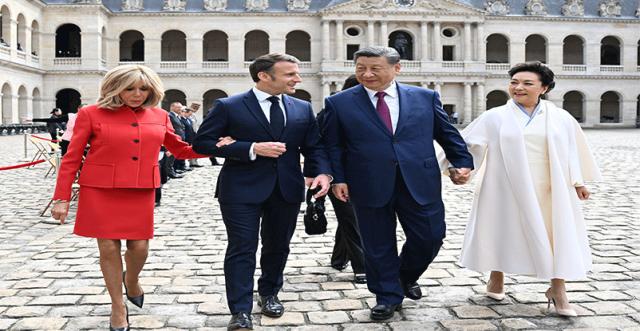
On a State visit to France, Chinese President Xi Jinping and his wife Peng Liyuan are welcomed in Paris by French President Emmanuel Macron and his wife Brigitte Macron, May 6, 2024 (Photo by Xinhua)
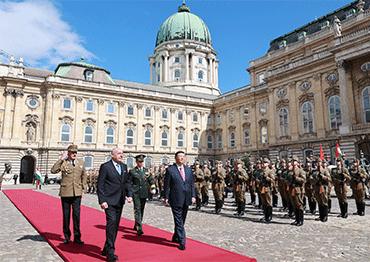
Chinese President Xi Jinping and Hungarian President Tamas Sulyok inspect a guard of honor at the welcome ceremony held by Sulyok and Hungarian Prime Minister Viktor Orban, Budapest, Hungary, May 9, 2024 (Photo by CNS)
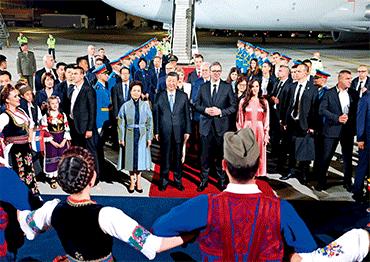
Chinese President Xi Jinping is warmly welcomed by Serbian President Aleksandar Vucic and his wife Tamara Vucic, Nikola Tesla Airport, Belgrade, May 7, 2024 (Photo by Xinhua)
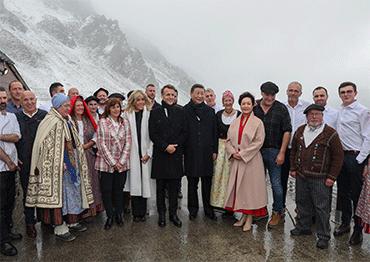
China-France-Europe:Chinese President Xi Jinping and his wife Peng Liyuan and French President Emmanuel Macron and his wife Brigitte Macron pose for a group photo on a snowy day with local residents at the Col du Tourmalet, Hautes-Pyrenees Department, France, May 7, 2024 (Photo by Xinhua)
When Chinese President Xi Jinping arrived in Paris on a State visit to France on May 5, he was received with a red carpet and a guard of honor. The next day, French President Emmanuel Macron held a grand welcome ceremony for Xi and his wife, Peng Liyuan.
The visit ostensibly serves to commemorate the 60th anniversary of the establishment of diplomatic ties between China and France. It is Xi’s third State visit to France as Chinese president. His previous visits came in 2014 and 2019, the 50th and 55th anniversaries of the establishment of diplomatic relations between the two countries.
Xi’s arrival in France marked his first trip to Europe in five years, after which he also visited Serbia and Hungary.
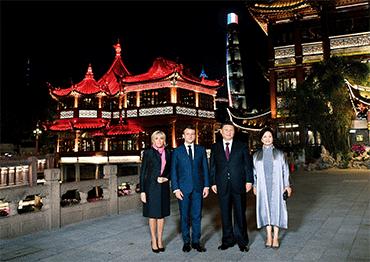
Chinese President Xi Jinping and his wife Peng Liyuan pose for a photo with French President Emmanuel Macron and his wife Brigitte Macron at Yu Garden in Shanghai, November 5, 2019 (Photo by CNS )
Personal Touch
Besides bilateral talks at the Élysée Palace, Macron welcomed Xi on May 7 at the Col du Tourmalet in the HautesPyrenees Department in southwestern France. Dubbed Macron’s second home, the mountainous town has personal significance for Macron, where he spent his summer and winter vacations with his maternal grandmother.
The arrangements are seen as a reciprocal gesture for Macron’s high-profile visit to China in April 2023, during which he was given a grand gun salute, inspected a guard of honor, and attended a state dinner in Beijing.
Xi also took Macron to Guangdong Province in southern China, where his father, Xi Zhongxun, had served as governor and spearheaded the country’s reform and opening-up. The two held informal meetings in Xi Zhongxun’s former residence in Guangzhou, capital of Guangdong, and visited Lingnan Garden, where they admired the scenery and sampled tea while listening to “Flowing Water,” a 1,000-year-old classic guqin (Chinese zither) melody that conveys feelings of great friendship.
At the Col du Tourmalet, Macron and Xi and their wives, Brigitte Macron and Peng Liyuan, dined in a mountain restaurant and watched a traditional folk dance performance.
It is not the first time that the two sides have added personal touches to the high-stakes diplomatic exchanges between the two countries. When Xi visited France in 2019, Macron received him at Villa Kerylos, a century-old Greek Revival-style house by the Mediterranean which is seen as a microcosm reflecting European civilization. Later that year in November, Xi hosted Macron in Shanghai’s 400-year-old Yu Garden, one of the most celebrated classical Chinese gardens in the country.
From Villa Kerylos to Yu Garden, and from the residence of Xi’s father to Macron’s second hometown, these arrangements not only create a more relaxed atmosphere that allows for more open and honest dialogue, but also symbolize the specialness of the ChinaFrance relationship.
“The China-France relationship is a special relationship among major countries in the world,” Xi said during his speech delivered at the welcome banquet hosted by Macron. Emphasizing that both countries are committed to the spirit of independence and both have a strong sense of responsibility, Xi said that China and France represent Eastern and Western civilizations and “have a fine tradition of mutual appreciation and mutual attraction.” Xi called for the two countries to “work together for the betterment of the world” and “jointly inject hope into a confused world and explore the way forward for human progress.” “The significance of the relationship between China and France extends well beyond typical bilateral ties. It is one of the most crucial bilateral relationships within broader China-Europe interactions. It plays a vital role in the dialogue and cooperation between Asia and Europe,” Zhang Jinling, a research fellow at the Institute of European Studies of the Chinese Academy of Social Sciences, told NewsChina.

Visitors try French cheese at the 2nd China International Import Expo, Shanghai, November 8, 2019 (Photo by VCG)
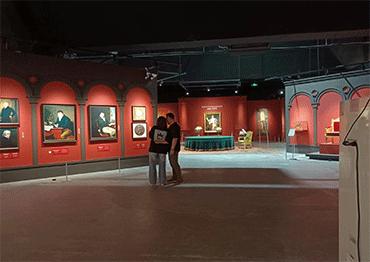
Visitors to the exhibition “Meet Napoleon: The Disappeared Palaces” view some of the 81 art pieces and sets of furniture from Napoleon’s three palaces, 798 Art District, Beijing, May 14, 2024. Running through June 20, the event commemorates the 60th anniversary of China-France diplomatic relations and is part of the China-France Year of Culture and Tourism (Photo by Li Jia)
‘Strategic Autonomy’
Compared to other European countries, France has a long history of pursuing strategic autonomy, which led to the rise of Gaullism in the 1960s. With its focus emphasizing independence and autonomy, the doctrine also emphasizes France’s core leadership in Europe and its position as a major power in international affairs. Under the influence of Gaullism, France withdrew from NATO’s integrated military command structure in 1966 and only rejoined in 2009.
Regarding its relationship with China, France established a formal diplomatic relationship with China in 1964, making it the first major Western country to do so. France is also the first major Western country to engage in “strategic dialogue” with China. In 2004, France became the first major Western country to establish a “comprehensive strategic partnership” with China. France also maintained close cooperation with China in nuclear energy, including jointly developing China’s first nuclear power plant, and along with other members, the world’s largest “artificial sun,” the International Thermonuclear Experimental Reactor (ITER) which aims to create energy through a fusion process similar to that of the sun.
After entering the Élysée Palace in 2017, Macron positioned himself as an heir to Gaullism, pledging to reclaim France’s international status. As the US has been trying to rally its Western ally around its decoupling/derisking agenda against China, France opted for a more independent position than other European nations.
On his flight back from his highprofile visit to China last year, Macron stated that Europe could not blindly follow the US’ lead and should avoid “getting dragged into crises that are not our own,” presumably referring to the Taiwan question. Advocating for Europe to play the role of a balancing force, Macron said that “the great risk” Europe faces is that it “gets caught up in crises that are not ours, which prevents it from building its strategic autonomy.” In a speech delivered on April 25 at Sorbonne University in Paris, Macron reiterated his call for a stronger, more independent European Union. “The US has two priorities: the US first and the China question second. The European question is not a geopolitical priority,” he said, adding that Europe needs a more credible defense policy to stand up to Russia and not be a strategic “vassal” to the US.
In an interview with the Economist on May 2, Macron reaffirmed his earlier rhetoric that the country does not rule out sending troops to Ukraine, a position criticized and rejected by other NATO members. As the gesture has led to concerns that it runs the risk of escalation and expansion of the RussiaUkraine war, Macron urged France and China to maintain a close dialogue on the issue.
Meeting the press in a joint conference with Macron on May 6, President Xi reemphasized that history has proven time and again that at the end of the day, conflicts can only be resolved through negotiation, and called on all parties to resume engagement and dialogue to build mutual trust. Xi also said that China supports a balanced, effective and sustainable security architecture in Europe. In addition, “China is ready to work with France to advocate, on the occasion of the Paris Olympic Games, a cessation of hostilities around the world during the Games,” Xi said.
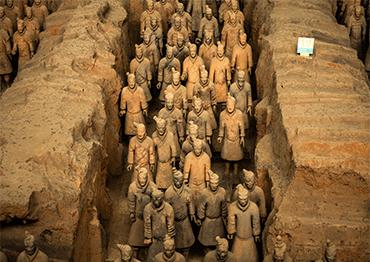
During Chinese President Xi Jinping’s State visit to France from May 5-7, the two countries reached an agreement on cooperation on restoring Notre-Dame Cathedral in Paris and protection of the Terracotta Warriors in Xi’an, Shaanxi Province (Photo by VCG/IC)
Agreements and Exchanges
During his talks with Macron in Paris, Xi also called for China and France to “uphold mutual benefits, jointly oppose acts of decoupling and disrupting industrial and supply chains, and say ‘no’ together to building barriers.” According to data from China’s Ministry of Commerce, France is China’s third-biggest trade partner within the EU, after Germany and the Netherlands.
In 2023, bilateral trade between China and France reached US$78.9 billion. With a trade deficit against China of just US$4.3 billion, down from US$10.1 billion in 2022, France also has a more balanced trade relationship with China compared to other EU members.
Data from the Ministry of Commerce shows that against the Biden administration’s efforts to push for divestment from China, France’s direct investment to China reached US$1.34 billion in 2023, an increase of 77 percent compared to the previous year.
In January and February of this year, direct investment from France to China grew by a staggering 585.8 percent year-on-year.
During Xi’s visit, the two countries signed four joint statements covering a wide range of areas involving regional and global issues and bilateral cooperation, such as Middle East issues, AI and global governance, biodiversity and oceans, and agricultural cooperation.
In the joint statement on the Middle East situation, the two permanent members of the UN Security Council called for an immediate and sustainable ceasefire, ensuring the provision of large-scale humanitarian aid to Gaza and protecting civilians as the most pressing tasks. The two leaders also expressed support for a two-state solution for Israel and Palestine, recognizing it as the path toward lasting peace.
In the joint statement on AI and global governance, China and France said the two countries realize the risks brought by the rapid development of AI technology and believe that it is crucial to push for suitable global governance.
The statement also stressed the importance of international cooperation on the basis of respecting national sovereignty and international security and stability. In November 2023, China and France signed the Bletchley Declaration, the first international agreement on AI at the AI Safety Summit in the UK.
In the joint statement on protecting biodiversity and marine ecosystems, China and France said they are committed to protecting and restoring marine ecosystems and marine biodiversity to boost environmental multilateralism.
They pledged to reduce marine pollution and fight illegal, unreported and unregulated fishing.
In a joint statement on agricultural cooperation, the two countries agreed to boost joint efforts in the wine industry and poultry and to strengthen cooperation in farming and exchanges of young talents.
“It shows that China and France share a high degree of consensus in jointly addressing global challenges and avoiding bloc confrontations,” said Sun Haichao, former Counsellor at China’s Embassy in France, and currently vice-chairman of the Center for European Studies of the China Foundation for International Studies.
The two countries also signed 18 cooperation agreements between government agencies, covering a wide range of areas such as green development, manufacturing, new energy, aviation, agriculture, small business cooperation, cultural relics protection and exhibition exchanges.
According to Sun, a major area of cooperation this year are cultural and people-to-people exchanges. In late January, the two countries’ cultural authorities launched the China-France Year of Culture and Tourism, which is being marked by a series of events in both countries with rich ancient cultural resources and history.
At a joint meeting with the press with Macron on May 6, Xi announced that China has extended the short-stay visa exemption policy for citizens of 12 countries, including France, to the end of 2025.
“China and France initiated reciprocal cultural years for the first time during the period between 2003 and 2005, and France is the first foreign country with which China co-hosted a national-level cultural year,” Sun said, adding that as France is set to host the Paris Olympic Games this summer, cultural and people-to-people exchanges between the two countries could reach a new level.
According to Professor Ding Chun, director of the Center for European Studies at the Shanghai-based Fudan University, for 60 years, China and France have established good, stable communications in the political, economic and cultural fields, and ChinaFrance cooperation has long been a step ahead of collaborations with other European countries.
Ding added that as presidential diplomacy has further enhanced the bilateral relationship, it would play a very pivotal role to help to restore and reshape the overall relationship between China and Europe.
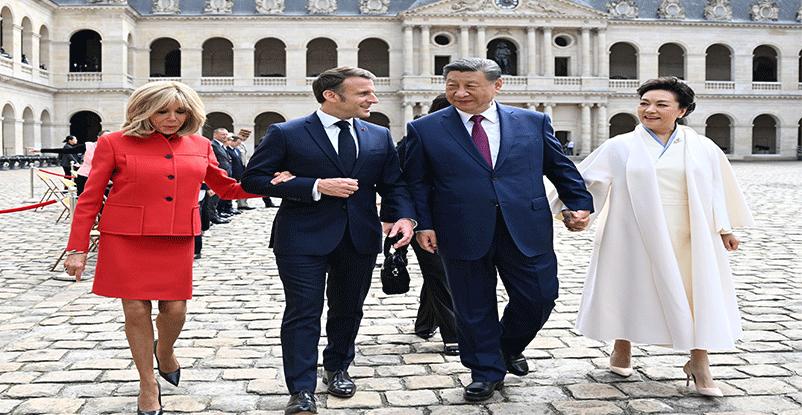
 Old Version
Old Version








